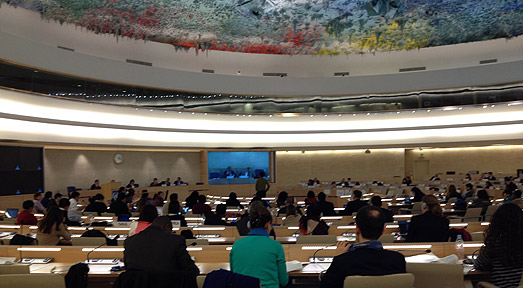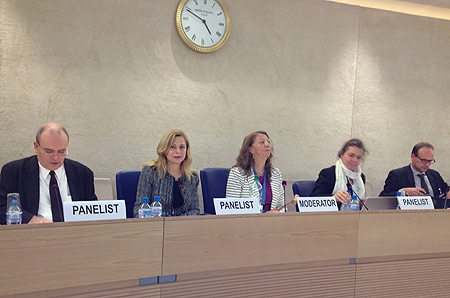[hupso_hide][hupso title=”CIW at @UN: What if workers designed their own #CSR program? Breaking report from UN, @TrustWomenConf!” url=”https://ciw-online.org/?p=17489″]
CIW, FFSC presentations bring real world solutions to debate on human rights abuses at UN Business and Human Rights Forum in Geneva, “Trust Women” Conference in London!
The Fair Food Program’s European sojourn is a wrap, and the groundbreaking social responsibility program is making waves in the world of business and human rights, where its unique mechanisms for worker participation and strict market consequences for human rights violations are pointing the way toward a new model of real, measurable social change.
Geneva
With more than 1,700 delegates from over 85 countries — including such high profile speakers as the Nobel-prize winning economist Joseph Stiglitz and the former President of Ireland and UN High Commissioner on Human Rights Mary Robinson — the Second Annual UN Forum on Business and Human Rights last week was a landmark event in the new and growing movement to end human rights violations in global corporate supply chains.
From the stripping of land from local communities and brutal murder of workers and human rights defenders in the mining industry, to the tragic deaths of hundreds of garment workers every year in preventable factory fires, to the systemic abuses, including modern-day slavery, that have long plagued agriculture across the globe, human rights violations at the root of today’s multi-billion dollar corporate supply operations are no longer hidden from view in the 21st Century. Increasing public scrutiny of corporate business practices, including events like last week’s UN Forum, is resulting in the demand for concrete solutions to this human rights crisis, and the CIW’s Fair Food Program stood out last week as a beacon of hope in a field still searching for credible answers.

Judge Laura Safer Espinoza, Director of the Fair Food Standards Council, and Greg Asbed, representing the CIW, participated in two panels on the first day of the two-day conference.
Judge Safer Espinoza, pictured here below (second from left), spoke on a panel addressing non-judicial remedies to human rights violations in corporate supply chains. She described the concrete results from the FFP’s first two seasons in operation (you can find the FFSC’s first Annual Report, covering the first two seasons, here), and explained how the Program’s unique structure functions to protect workers’ rights, and eliminate long-standing abuses, from sexual harassment to modern-day slavery. Here’s an excerpt from her presentation:
I live and work in an area of the U.S. that federal prosecutors have called “ground zero for modern day slavery.” Despite the dismal history behind that label, my presentation today could be titled – “from ground zero for modern day slavery to zero slavery cases on FFP farms.” That transformation has taken place in a 650 million dollar industry impacting tens of thousands of workers each season, because of a very effective combination of rights and enforcement mechanisms established by the Fair Food Program.
The program is a multi-stakeholder initiative of workers, buyers and growers in Florida’s tomato industry. As you will hear, it is worker–driven and built on a premise suggested by the Guiding Principles – that purchasing power of major food-buying corporations can and should be used as a force to address the adverse human rights impact its downward pressure has historically exerted on wages and working conditions…
Judge Safer Espinoza went on to describe the work of the FFSC in detail to an audience clearly tired of public relations answers to human rights abuses and hungry for substantive solutions:
… The creation of the FFSC – a separate monitoring and enforcement organization, indigenous to this program – is unique in U.S. agriculture. The FFSC conducts intensive audits at all Participating Growers, in announced and unannounced visits. Large percentages of workers are interviewed in the fields and off-site. Audit reports and corrective action plans – detailed road maps to compliance with firm time frames – are provided to growers. We also respond to a 24-hour complaint line – our multi-lingual staff investigates and resolves those complaints, normally in collaboration and through negotiation with Participating Growers. Dialogue is the norm, formal decision rendering where consensus has not been reached, the exception.
The complaint process is transparent – impacted stakeholders are continuously informed and consulted. Investigation and resolutions are expedited – achieved within days or weeks, to be meaningful, given the seasonal nature of the work and worker turnover.
Our resolutions and corrective actions frequently have an educational component for workers and supervisors and they address systemic as well as individual issues. Statistical analysis in our recently published Annual Report report demonstrates an evenhanded approach in resolving hundreds of complaints. The input of thousands of workers who access the complaint process, speak to auditors without fear of retaliation, participate in education sessions and health and safety committees at all Participating Growers, enables the Council to monitor the Program with integrity. Most growers have come to recognize the eyes and ears of the Fair Food Program as beneficial risk prevention for their operations – prevention that is highly motivated by potential loss of sales to Participating Buyers.
The CIW’s panel, entitled “Responsible Supply Chain Management in Alignment with the UN Guiding Principles,” was a lively discussion that examined, among other things, the role of workers in the protection of their own rights at the bottom of corporate supply chains. Asbed began his presentation inviting the audience to participate in a “thought experiment” on a new model of social responsibility:
In honor of the fact that we are only 100 miles from the town of Berne, Switzerland, the town where Albert Einstein lived when he conducted the famous thought experiments that forever upended the way we think of space and time, I would like to begin by inviting you to join me in a thought experiment on social change, by thinking about this question:
What if workers – the rights holders themselves – designed their own social responsibility program? What would that program look like?…
After discussing the differences between traditional corporate social responsibility programs and one built by workers to eliminate the abuses they themselves face every day at work – differences including a Code of Conduct designed to eliminate industry-specific forms of exploitation that no outside architect could know, an emphasis on enforcement every bit as strong as that on the standards themselves, and real consequences for violations, like the market consequences of the FFP, buttressing the enforcement – Asbed concluded by saying:
… In closing, the conclusion is simple. If the goal of the social responsibility program is to protect the public perception of a brand, then by all means the brand-holder should design the program because the brand-holder knows best how to protect its own image.
But if the goal of the program is to protect human rights, then the humans whose rights are at stake must themselves take the lead role in designing the program. And when such programs do exist – as is the case of the Fair Food Program in Florida agriculture — corporations connected to that supply chain must be held accountable to those standards.
The Fair Food Program sparked the imagination of the overflow audiences present at both panel discussions and was the topic of conversations throughout the event, both among delegates and in many of the panels the following day. The CIW and the FFSC look forward to an ongoing collaboration with the UN Working Group on Business and Human Rights and to sharing lessons from the continued development of the Fair Food Program with the global movement for workers’ rights in the years ahead.
London
While the UN Forum was all business, the Trust Women Conference in London brought more than a bit of glamor to the discussion of women’s rights in the global marketplace. Sponsored by media giants Reuters and the International Herald Tribune — and with a participant list that included Selma Hayek, Queen Noor of Jordan, and Christy Turlington — the Trust Women Conference built an impressive platform for the topic of human rights.
But, once again, it was the CIW and its real world program for measurable change that grounded the discussion and put a check on the corporate platitudes that all to often carry the day in such a setting.
Laura Germino represented the CIW on a panel entitled “Trafficking in the Supply Chain,” moderated ably by investigative journalist and social change investor Benajmin Skinner and including among the panelists CIW ally Walk Free, represented by their CEO Nick Grono. Interestingly, the panel also included Carl Graziani, a Senior Vice President for supply chain management with Safeway. The dynamic created by the juxtaposition of the CIW, with its enforceable, worker-led program for real social accountability, and Safeway, a company that has refused to join the Fair Food Program, resulted in more than a few sparks, particularly during the wide-ranging question and answer session following the prepared presentations. Here below are a few of those moments, excerpted from the full video of the panel, which you can see here:
Unfortunately, the joint panel participation didn’t result in a dramatic breakthrough with Safeway signing a Fair Food agreement before the evening was finished (not that anyone was holding his or her breath…). In fact, Safeway’s contribution to the “2013 Trust Women Actions” initiatives following the conference — “Safeway proposed the development of tools to map supply chains risks and raise alerts, using information from NGOs, social media, government agencies and open data” — was a classic example of the kind of corporate-designed social responsibility initiatives that sound like action but ultimately result in no real change, while sexual harassment, modern-day slavery, and factory fires continue unabated.
If there is one message that came across loud and clear at both the UN Forum in Geneva and the Trust Women Conference in London it is this: The time for empty words and public relations gestures is past; now is the time for action.
It is not enough for Safeway, or any of its colleagues in the corporate world, to attend these forums and to subject their supply chain executives to an hour of ritualized penance where they are forced to sit in the room with victims of abuse and to hear, again and again, the voices of human rights defenders urging them to take substantive action. Just showing up is not enough. It’s time for Safeway, and the rest of the supermarket industry in the case of the Fair Food Program, to actually listen. Listen to the words of workers who have suffered decades of abuse at the bottom of their supply chains. Listen to the advocates who have investigated, documented, and prosecuted those abuses. And — when the opportunity presents itself, as it does in the Fair Food Program — listen to the workers and consumers who have organized to demand a more humane food industry and forged a model to bring that new industry into the 21st Century. The Fair Food Program is a model that is at once a singularly effective, proven program for identifying and eliminating longstanding abuses and a promising partnership that leverages the strengths of all the actors along the length of the supply chain, from consumers and corporations at the top to growers and workers at the bottom. There is, as Laura Germino said on the panel with Mr. Graziani sitting mutely by her side, simply no good reason not to join it.
And that is a message that is growing clearer — and louder — by the day, not just here in the US but, as this past week showed, across the globe.

